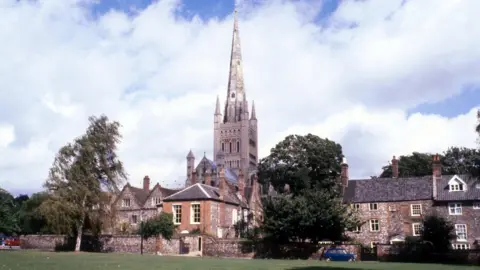Covid-19: Norfolk remains with highest level of restrictions
 BBC
BBCNorfolk is to remain in tier four - the highest level of anti-coronavirus restrictions - following the government's latest announcements.
Under the tier four, all non-essential shops must close, along with hair salons and leisure centres.
Norwich has the worst rate in the county with 274.6 cases per 100,000 (386 new cases) in the seven days to 25 December.
That figure is up from 246.8 cases per 100,000 in the week to 18 December.
South Norfolk had 261.2 per 100,000 and King's Lynn & West Norfolk had 257.6 cases per 100,000 in the seven days to 25 December.
It has been announced that Norfolk's largest general hospital is providing support for the worst-hit area for Covid-19 infections in East Anglia - Essex.
The Norfolk and Norwich University Hospital has officially been designated a "surge hospital" for Essex - which means it can deal with an overflow of virus patients from elsewhere.
A hospital spokesman said it was looking after more than 150 coronavirus patients - higher than the number during the peak of the first wave of Covid-19 in the spring.

What are the restrictions in tier four?
- Residents should stay at home, unless they have a "reasonable excuse" such as work or education
- All non-essential shops must close
- Hairdressers and nail bars must close
- Indoor entertainment venues must close
- Gyms and indoor swimming pools, indoor sports courts and dance studios must close
- You cannot meet other people indoors, unless you live with them or they are part of your support bubble
- People should not leave tier four areas or travel abroad, except for limited reasons (including work and education)
- Weddings and civil partnership ceremonies are only allowed in exceptional circumstances
"Clinically extremely vulnerable" people in tier four areas are advised to stay at home "as much as possible". The government says if they cannot work from home, they should not go to work.
What can you do in tier four?
Activities still allowed include:
- Meeting one other person from another household in an open public space, if you are both alone
- Shopping for essentials such as food and medicine
- Outdoor pools, playgrounds, sports courts, golf courses and horse riding centres can open
- You can leave home for work, education, training, childcare and for medical appointments and emergencies
- Communal religious worship
- Support bubbles are still allowed and children can move between separated parents
Source: BBC News tiers explainer

For a more detailed look at coronavirus where you live, use the BBC's postcode checker:
Or you could use this interactive map to check your district:


Find BBC News: East of England on Facebook, Instagram and Twitter. If you have a story suggestion email [email protected] .
